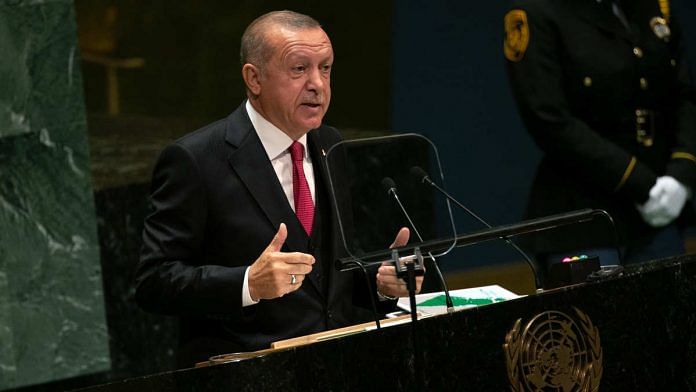New Delhi: The war of words between Turkey and France, which began after French teacher Samuel Paty was beheaded for sharing caricatures of Prophet Muhammad with his class, has deeper implications, said ThePrint’s Editor-in-Chief Shekhar Gupta in episode 604 of ‘Cut the Clutter’.
Gupta said it is a probable conflict, yet at the same time highly unlikely.
What makes it probable is that France has traditionally seen itself as the centre of global liberalism and under Emmanuel Macron, the country is acting against what it sees as a threat from radical Islam.
Turkey, under Recep Tayyip Erdogan, in turn, has positioned itself as the global guardian of pan-Islamism or Islam. Turkey also has allies in Pakistan, Azerbaijan and Malaysia to some extent.
What makes this conflict unlikely is that both France and Turkey are members of the military and strategic alliance, the North Atlantic Treaty Organisation (NATO), said Gupta.
As a member of NATO, Turkey is also home to some nuclear warheads that were scattered by the US after the Cold War.
The country has, over decades, tried to fashion itself as a European country in terms of its values, standard of living and lifestyle but it still could not join the European Union.
Also read: Pompeo expresses concern over Turkey’s actions in Eastern Mediterranean
Deeper meaning and implications of conflict
After the beheading of Paty, there have been protests from both sides of the spectrum.
In France, citizen groups have put up the controversial cartoons in public places across Paris. While in Bangladesh, 40,000 people held a rally protesting the caricatures.
Pakistan Prime Minister Imran Khan also expressed his displeasure over the incident but the sharpest reaction has come from Turkish President Erdogan. He asked his countrymen to boycott all French goods. Ironically, old photographs of his wife carrying a Hermes handbag, a French luxury brand, surfaced online at the same time.
The French police are also cracking down on Islamic think tanks and intellectual groups in search of radical influences.
According to a report in The New York Times, in the last eight years, there have been more than 36 attacks that owe their origin to Islamic State in France. Hundreds of people have died, including two attacks where more than 200 people died.
The French have used sharp words against the fatal attack on the schoolteacher. Macron, who is not known for using harsh words, said: “French in Islam needs Enlightenment”. This is a loaded statement considering the Islam-Christian history.
Erdogan, too, has used harsh words to the effect that the French President is in need of “mental treatment”. This statement has been applauded by Muslim countries across the world, albeit some did it silently while others, like Pakistan, have done it openly.
Also read: Why French President Macron’s clash of civilisations with Islam is misguided
Turkey as ‘nuisance’ state
Under Erdogan, Turkey has been trying to take on all the major countries of the world, especially with its neighbours, said Gupta.
It has stepped into the ongoing civil war in Libya and Syria — a move that has irritated the Russians. In Azerbaijan, they are now helping Azerbaijanis against Armenia, which Russia sees as an interference in an area of their core interests.
In Greece, Turkey has claimed hydrocarbon reserves and areas that Greece considers its own. Greece, which is a NATO member state, is being backed by France in this conflict.
Erdogan has also made statements against India. During the Delhi riots in February this year, Erdogan said, “Who’s dying in India? It’s Muslims. Who’s killing Muslims in India? It’s Hindus.”
The Turkish television networks also ran misleading stories on Jammu and Kashmir, Gupta said.
Turkey is also friendly with Hamas, a Palestinian Sunni-Islamic fundamentalist organisation, which is an irritant for Israel. Cyprus and Turkey have been at loggerheads over a territorial dispute for decades now. In Iraq, too, the Turkish Kurds have annexed territories and are involved in the war.
Russia, primarily, views Turkey as a major nuisance but Turkey is afraid of pushing it too far with Moscow, said Gupta.
For example, in 2015, when the Turks blew up a Russian Sukhoi jet, Russian President Vladimir Putin called it a “stab in the back”, to which Turkey immediately issued a written apology.
While Turkey itself has imprisoned several journalists back home, when the Jamal Khashoggi, a Washington Post columnist, was murdered in Saudi Arabia, Turkey did not shy away from embarrassing the Arabs.
With Erdogan’s stance in these issues, other Sunni Muslim nations in the world may start seeing him as a leader worth following.
According to an article written by Indian-American journalist Bobby Ghosh, in 2010 turks were seen as a zero problem, but in 2020 it is being seen as an only problem country.
Also read: How Turkey’s Erdogan is getting away with his foreign policy adventurism
Turkey’s economy
Turkey’s economy is in shambles and even Erdogan’s popularity has waned in recent times.
Unemployment in the country is 15 per cent and inflation is also running at 12 per cent. Turkey’s currency Lira has lost 26 per cent against the dollar.
With this conflict with the French, Erdogan may have bitten more than he can chew since the former can do damage to his already weakened economy. Especially with changes underway across the world, including the possible election of Democrat candidate Joe Biden as the US President.
Watch the latest episode of CTC here:




And of course, The Print being a leftist China lover, jihadist rag………. supports Turkey.